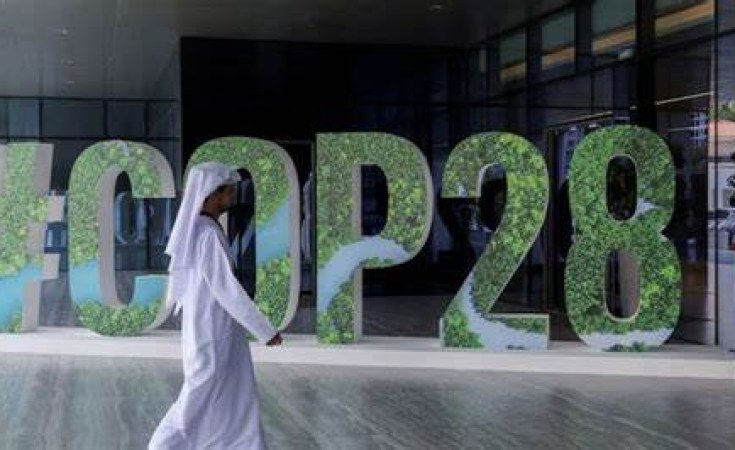Governments taking part in COP28, including the fossil-fuel producing conference host, the United Arab Emirates (UAE), must take concrete and bold steps to avert the worst harms of the climate crisis, amid alarming water scarcity exacerbated by climate change, including for states in the Middle East and North Africa (MENA), said Amnesty International today.
These steps should include urgently phasing out fossil fuels and providing human rights-based climate finance, two measures that are critical to ensure people's right to water in the MENA region.
''Many countries in MENA are grappling with crises, including staggering debt, the destruction and damage wrought by conflict, and now exacerbated water scarcity due to the climate crisis in a region where water is already vanishingly scant,'' said Kristine Beckerle, Amnesty International's Economic, Social and Cultural Rights Advisor in the Middle East and North Africa Regional Office.
''So far, the response from governments in MENA to ensure the right to water has been woefully inadequate.''
Whether or not people's right to water are met depends not only on how much water there is, but how governments manage, distribute and protect the water available. In the context of the climate crisis, MENA governments should be intensifying efforts to protect and guarantee sufficient water supplies, including by ensuring that disadvantaged and marginalized groups who will be disproportionately harmed by the crisis, such as rural communities, subsistence farmers, fisherfolk and migrant workers, can meaningfully participate in planning, proposals and monitoring.
Many countries in MENA are grappling with crises, including staggering debt, the destruction and damage wrought by conflict, and now exacerbated water scarcity due to the climate crisis in a region where water is already vanishingly scant. So far, the response from governments in MENA to ensure the right to water has been woefully inadequate.Kristine Beckerle, Amnesty International's Economic, Social and Cultural Rights Advisor in the Middle East and North Africa Regional Office
Human rights experts have repeatedly found that negligence, mismanagement, discrimination and attacks on water sites have harmed people's right to water in the region. Yet is must also be recognised that MENA countries have significantly varying capacities to cope with the shared challenge of the climate crisis, with some facing severe financial and economic challenges while others, like the COP28 host, enjoy some of the highest per capita incomes in the world. Yemen, for example, is one of the least developed countries in the world, while its neighbours, such as Saudi Arabia, the UAE and Qatar, are reaping immense profits from their national fossil fuel companies. These fossil fuel companies are already exacerbating the climate crisis with their vast production of fossil fuels, and yet they have plans to increase production even more contrary to what is needed to address the climate crisis.
This discrepancy, as well as the dire human rights records of these states, offers a bleak outlook for both existing and future generations' ability to enjoy their right to water in the MENA region.
It is not only high-income fossil fuel states in the Gulf failing on this front.Across the globe, governments, particularly industrialized countries that bear the greatest historical responsibility for emissions, are failing to take adequate steps to protect humanity from accelerating climate change and its devastating impacts, most notably by failing to phase out of all fossil fuels and end fossil fuel subsidies.
''Governments at COP28, which for the second year in a row is hosted by a MENA country, have an opportunity to take vital steps to help ensure the right to water in the region is met now and in the future. They must heed the call of activists and civil society groups by pairing a full, fast, fair and funded phase out of fossil fuels with a human rights-based approach to climate finance, including scaling up and improving the funds offered to help lower-income and lower middle income countries adapt to the changing climate,'' said Kristine Beckerle.
''People across MENA are already contending with the human rights harms of droughts, extreme heat and exacerbated water scarcity. COP28 must not turn into a platform for empty promises where governments can pretend they are taking steps but actually do nothing.''
Amnesty International is also calling for governments to respect and protect the right to water for everyone within their territories including by preventing and condemning attacks on water resources and ensure equal access to sufficient and safe water
BACKGROUND
Even during crises, governments have obligations to uphold the right to water. In addition, international human rights law and standards provide important guidance to MENA governments on areas to prioritize in water policy and practice to ensure they can uphold the right to water for current and future generations, particularly in the context of the climate crisis.
COP28 must not turn into a platform for empty promises where governments can pretend they are taking steps but actually do nothing.Kristine Beckerle, Amnesty International's Economic, Social and Cultural Rights Advisor in the Middle East and North Africa Regional Office
The climate crisis is severely exacerbating water scarcity in MENA. Climate attribution studies have found that recent heatwaves and multi-year droughts in MENA were made more likely to occur and/or more severe due to human-caused climate change.
Levels of drying in MENA are expected to increase with higher levels of global warming, according to studies by the Intergovernmental Panel on Climate Change (IPCC). If temperatures rise beyond 1.5°C, the Mediterranean, which includes parts of MENA, is set to become a ''hotspot of dryness change'' and witness ''an expansion of desert terrain and vegetation... causing changes unparalleled in the last 10,000 years,'' according to the IPCC.


